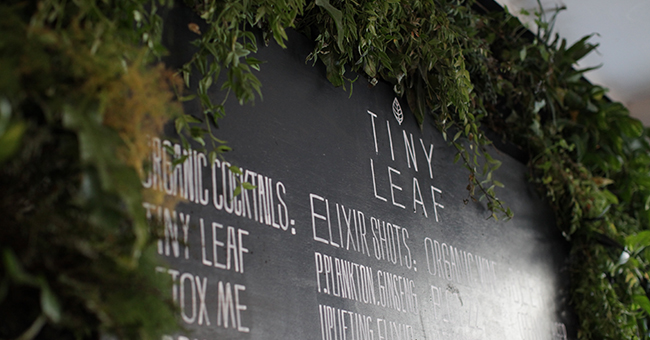It has been suggested that Tiny Leaf, which debuted earlier this year as a pop-up, could be London’s most eco-friendly restaurant. Not only does the kitchen use all-organic and vegan ingredients, but Tiny Leaf took it a step further by striving to produce no garbage. Founder and executive head chef Justin Horne, along with co-founder Alice Gilsenan Skyped in with us to share their advice for reducing your bar’s footprint — and maybe even going zero-waste.
1. Re-define “waste”
The kitchen at Tiny Leaf not only aimed to avoid contributing to food waste, it actually diverted food that would have otherwise ended up in landfill. The restaurant only sourced produce that couldn’t be sold to conventional grocery stores because it failed to meet aesthetic ideals. “The supermarkets are hyper competitive here, so you can’t have a carrot that’s two degrees misshapen,” Gilsenan said. But these foods are perfectly good to eat, and with a little creative prep, can look just as good on the plate. “We wanted to cancel any ideas that because it’s food waste, that it wouldn’t look desirable or taste desirable.”
At the bar and in kitchen, every ingredient was used to its maximum potential. “All our citrus fruit would be zested in the kitchen or at the bar, we’d keep the zest to use into oils or cakes,” said Horne. And the skins would be used to make bitters or limoncello.
https://instagram.com/p/BB25NZmHHvy/
2. Get closer to the source
Gilsenan said they initially approached conventional grocery stores about diverting food waste, but found they probably didn’t have the volume of otherwise unsold food needed to supply the restaurant. “We swam up the supply chain a little bit, and went to the suppliers of the supermarkets,” she said, and they bought directly from farmers and producers. This allowed Tiny Leaf to avoid packaging waste altogether, while meeting their volume needs.
3. Grow your own
Growing your own ingredients not only cuts down on potential packaging waste, it also reduces the carbon footprint of your menu by eliminating shipping. And what could taste fresher? Behind the bar, Tiny Leaf grew all its own herbs for use in cocktails and the kitchen.
https://instagram.com/p/BCtq4zqHHsq/
4. Create a flexible menu
Rescuing food meant that Tiny Leaf couldn’t count on always getting the same ingredients. “We had to be very flexible and spontaneous with our menu,” said Gilsenan. They created a basic spine for their menu, which could be adjusted according to the different ingredients that might arrive on a daily basis. For example, a rice and kimchi dish could be made with cabbage, or other lettuces could be substituted.
5. Skip the straws
Although the Horne said he considered reusable stainless steel straws, the real answer is to design cocktails that don’t require a straw.
6. Carry the concept into the decor
As part of the zero-waste ethos, no new furniture or tableware was purchased for the Tiny Leaf pop-up. Instead, the founders decided to up-cycle the tables left behind in their space, and repurpose dishes from Horne’s other company — a high-end catering company called All the King’s Men.
https://instagram.com/p/BBEETRonHvh/
7. Close the loop
Have a plan for food scraps other than the trash bin. If food scraps had no more edible potential at the Tiny Leaf pop-up, they were sent off to a nearby anaerobic digester to be turned into bio-gas. Another option for food scraps is to compost them. It’s easier than you might think.
Tiny Leaf is now looking for a more permanent location, as well as new investors, for the next iteration of the restaurant. Horne hopes that at their next spot, they’ll be able to have their digester to power the kitchen. He would also like to grow more of their own ingredients on-site, which could be nourished with organic fertilizer also produced by the digester. “The longer term plan is to build a circular economy, closed loop restaurant,” he said.




